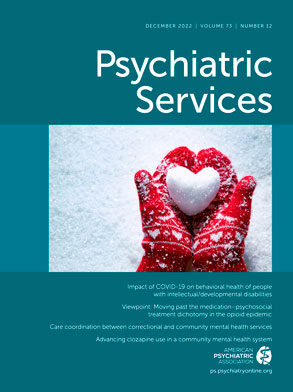Coordinated specialty care (CSC) is a multidisciplinary treatment model for early psychosis. It comprises medication management, supported employment and education, individual or group psychotherapy, case management, family services, and other evidence-based interventions that lead to client gains in several functional domains and to reductions in symptom burden. The success of CSC has made its implementation a national priority. A key mechanism for expansion has been a federal Mental Health Block Grant (MHBG) that requires a recipient state to allocate 10% of its grant to early psychosis treatment.
Two studies in this issue highlight the progress and remaining questions for this implementation. George and colleagues (
1) provide evidence of the role of the MHBG in expanding CSC. Meanwhile, Daley and colleagues (
2) investigated the racial composition of 35 CSC sites, finding that 70% of those sites served a disproportionately higher rate of Black individuals compared with the racial makeup of CSC “primary service areas” in which most clients resided, according to team leads.
George et al. found that 69% of the clinics they surveyed were initiated after the MHBG set-aside program was established (half of which were started after MHBG funds were increased in 2016 as part of the Cures Act). This provides evidence that federal funding, administered by state mental health authorities, can serve as a key incentive in implementation and scaling of evidence-based interventions, such as CSC. Unfortunately, the authors also found that only 14% of these clinics were operating at capacity, and one-third were operating at ≤50% capacity. These findings raise critical questions whether recruitment simply needs more time or whether the MHBG incentive is misaligned with community needs. Has CSC reached the target population, or does some portion of that population lack access (e.g., rural clients who might need to travel long distances for CSC and might instead benefit from mobile health options)? Should the target population be expanded (e.g., allowing greater duration of untreated psychosis, expanding diagnostic criteria)?
Daley et al.’s study explores whether CSC clinics are achieving health equity. Black individuals being overrepresented in mental health services is atypical generally, and the study did not find differences in receipt of Medicaid funding or recent use of emergency services or legal involvement that may account for referral source bias. Their study was exploratory with a small sample of clinics compared with number of CSCs nationally. Racial data were dichotomized (Black and non-Black), and further investigation is needed. Black individuals are known to receive a diagnosis of a schizophrenia spectrum disorder at a greater rate than other racial-ethnic groups—whether because of institutional racism or other risk factors—and so perhaps their greater representation in CSC is expected. Uncovering factors associated with high representation of Black individuals in CSC is necessary for health equity, and efforts should continue toward this end. At the same time, health systems must improve access to services for other often marginalized groups, such as Asian American/Pacific Islander and Native American/Alaska Native groups, who are rarely seen in CSC clinics.
Together, these studies raise questions about how to optimize continued funding for early intervention for psychosis. George et al.’s work highlights the importance of funding and need to dedicate resources to efficiently serve at-need populations. Daley et al.’s study brings up important issues about health equity and how to continue serving racial-ethnic diversity groups. Perhaps at the heart of both studies is a need for innovative strategies to engage and diversify community outreach and partnerships across CSC sites to better engage all individuals with early psychosis and their families. The Early Psychosis Intervention Network is a key resource to investigate potential engagement mechanisms and inform cultural adaptations, which may include emphasis on employment of bilingual clinicians, partnership with religious and spiritual communities, increased staff diversity, and more training on individual and cultural diversity. It can also investigate dissemination strategies to decrease stigma surrounding psychosis and increase public awareness of the effectiveness of early interventions.

